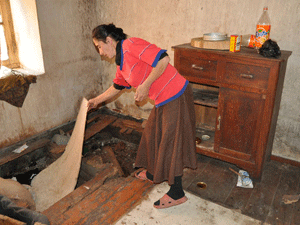Gela Mtivlishvili, Kakheti
According to the Caucasian Environmental NGO Network, the number of eco-migrants in Georgia is between 100 thousand and 120 thousand people. According to the official statistics, in 2004-2010 the state resettled only 838 families. The ministry of IDPs from the occupied territories, accommodation and refugees of Georgia periodically reports that the eco-migrants, resettled in various regions of Georgia, live in normal conditions. In fact, the situation is radically different.
The nine-member family of Ivanadzes was resettled in the village of Koreti in Akhmeta district from Adjara six years ago. The house, where the Ivanadzes live now, is damaged. The floor is downfallen in one room; the floor is damaged in other two rooms too and in order to protect it from down-falling the floor is fixed by wires. During the rain, the water is leaking into the rooms. The Ivanadzes do not have enough beds – nine people sleep in four beds. Besides that, the nine-member family is left without social allowance. Iamze Ivanadze said the allowance was stopped after their seventh child was born.
“We have not received the allowance for three months already. Before that, we used to get 200 GEL. We need three sacks of bread wheat per month. Now we do not have bread and live in unbearable conditions,” said Iamze Ivanadze.
Five children from the Ivanadzes should go to school but they cannot. Iamze Ivanadze said the school is in the next village five kilometers away and children cannot go there.
“We requested to appoint one bus in the village to send our children to school but they did not. If a child walks 5 kilometers every day, how s/he will be able to learn properly. Besides that, sheep-breeders have their sheep on the road who have huge dogs to look after the sheep and we are afraid to send our children on that road. We do not have books either. My child went to the first class this year but nobody gave him books. The other children were given wrong books and I gave them back. They have neither pens nor notebooks. My children are illiterate,” said Iamze Ivanadze.
Unless their living conditions improve, the Ivanadzes are going to return to Adjara.
Akhmeta district governor does not think it is dangerous to live in the house of the Ivanadzes. Koba Maisuradze said neither Ivanadzes nor other eco-migrant families live in dangerous conditions.
The representatives of the Akhmeta district office of the social agency do not comment regarding the Ivanadzes’ family.
Several eco-migrant families live in hard conditions in the village of Udabno in Sagarejo district too. “Strong wind often blows here. The wind damaged our house. It removed the roof and water is leaking in the rooms now. Only one room is safe and we all live in that room. When it is raining, we are afraid the house might pull down and we will be caught in it. I cannot afford repair of the roof. I appealed to the district administration several times but the governor told me they cannot assist me since they do not have funds. I live with my old mother and sick child. Our only income is my mother’s pension. We do not receive even social allowance,” said Rita Gogniashvili.
The eco-migrants living in the villages of Areshperani and Pona in Lagodekhi district blame the local authority in negligence. The houses, which the ministry gave to them, are damaged.
Manana Kaladze, eco-migrant: “The roof has fallen down. During the rain, the water is leaking into the house. The walls are cracked and are pulling down. During the wind, we shelter our neighbor; we are afraid of being caught in the ruins. We cannot build up the house; we are so poor that we hardly earn our living.”
Eter Surmanidze, eco-migrant: When it is raining, we are sitting with umbrellas in the house. The ground floor is flooded both in rainy and sunny weather. The house is very damp and we cannot dry it. The walls are pulling down because of damp. I applied to the Lagodekhi district governor several times; I even wrote letter to him but he did not pay attention to me. Other people also work at the district administration but nobody replied to my letter.”
Dimitri Loladze, Lagodekhi district governor: “We have not given them those houses and they should apply to the institution which gave them the houses.”
Short time ago, the minister of the IDPs from the occupied territories, accommodation and refugees Koba Subeliani visited Pona village in Lagodekhi district. The eco-migrants, besides the Beridzes – who hosted the minister in the village, did not have information about his visit. Before the minister left the village, the eco-migrants tried to meet him but the representative of the village governor and local officials did not allow them to meet the minister.
News
December 13, 2023
Ethnic minorities outside the peace dialogue
November 6, 2023
‘Peace’ agenda of political parties
Popular
Articles
February 13, 2024




